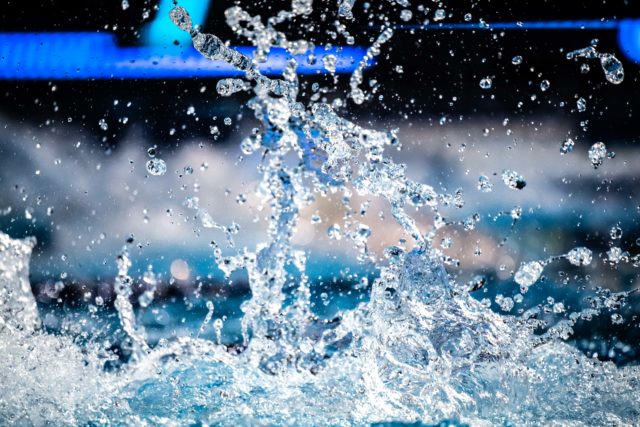Cold Water Swimming: Benefits and Tips for Beginners

Yesterday at 08:00 AM
By Sanuj Srivastava on SwimSwam
Note: Consult a healthcare professional if you’re unsure if cold water swimming is right for you.
Cold water swimming, also known as open water or ice swimming, has gained immense popularity for its surprising health benefits and the sheer thrill it offers. Whether you’re taking a dip in a cold lake or braving the winter sea, this activity can be invigorating and rewarding.
Many Olympians and elite athletes incorporate cold water therapy into their recovery routines to enhance performance and reduce downtime between training sessions. The cold temperature constricts blood vessels, reducing inflammation and muscle soreness caused by intense physical activity. This process, followed by rewarming, promotes increased blood flow, flushing out toxins and delivering oxygen-rich blood to the muscles. As a result, athletes experience faster recovery and improved readiness for subsequent training or competition.
Here’s a closer look at its benefits along with tips for safe and enjoyable cold-water swimming.
Benefits of Cold Water Swimming
1. Boosts Mental Health
Reduces Stress and Anxiety: Some studies show that cold water immersion can reduce symptoms of depression and anxiety. The release of endorphins, also known as “happy hormones,” helps improve mood.
Improves Resilience: Regular exposure to cold water builds mental toughness, teaching your body and mind to adapt to challenging situations.
2. Enhances Physical Health
Strengthens Immunity: Research suggests that repeated exposure to cold water can enhance the production of white blood cells, bolstering the immune system.
Improves Circulation: The body’s response to cold water—vasoconstriction followed by vasodilation—enhances blood flow and cardiovascular health.
Reduces Inflammation: Cold water immersion helps lower inflammation, aiding in muscle recovery and reducing joint pain.
3. Burns Calories
Swimming in cold water forces the body to work harder to maintain its core temperature, increasing calorie burn. This can support weight management goals.
4. Improves Sleep
Cold water swimming promotes better sleep quality by regulating the nervous system and inducing a state of relaxation post-swim.
5. Increases Energy Levels
The shock of cold water stimulates adrenaline production, leaving you feeling refreshed and energized.
Scientific Data Supporting Cold Water Swimming
- Immune Boost: Regular cold water swimmers had increased antioxidant levels and improved adaptive immune responses.
- Mental Health Improvements: Individuals suffering from depression experienced significant mood improvements after participating in cold water swimming.
- Calorie Burn: Cold water swimmers can burn up to 500 calories in a 30-minute session, depending on water temperature and intensity.
Tips for Cold Water Swimming
Before the Swim
1. Acclimatize Gradually
Start by taking cold showers or short dips to prepare your body for colder temperatures.
2. Check the Conditions
Ensure the water temperature is safe (above 10°C for beginners) and avoid swimming in extreme weather or dangerous waters.
3. Wear the Right Gear
A wetsuit provides insulation and buoyancy. Neoprene gloves, socks, and a swim cap can protect extremities.
4. Stay Hydrated
Dehydration increases the risk of hypothermia, so drink water before your swim.
During the Swim
1. Enter Slowly
Avoid jumping in. Gradually immerse yourself to let your body adjust to the cold.
2. Focus on Breathing
Control your breathing to counter the initial shock. Take slow, deep breaths.
3. Swim with a Buddy
Always swim with a companion or ensure there are lifeguards around for safety.
4. Know Your Limits
Avoid staying in the water too long. Beginners should start with short swims (1-2 minutes) and gradually increase time.
After the Swim
1. Warm Up Gradually
Change into warm, dry clothes immediately and drink a hot beverage. Avoid hot showers directly after swimming.
2. Monitor Your Body
Watch for signs of hypothermia, such as shivering, numbness, or slurred speech.
Who Should Avoid Cold Water Swimming?
Note: This is not medical advice. Consult a healthcare professional if you’re unsure if cold water swimming is right for you
- People with heart conditions or severe asthma should consult a doctor before trying cold water swimming.
- Pregnant individuals or those with underlying medical conditions should also seek medical advice.
Cold water swimming offers a unique blend of physical and mental health benefits, making it an excellent activity for those looking to challenge themselves. By following safety precautions and listening to your body, you can enjoy the invigorating experience while reaping its rewards. Whether you’re a seasoned swimmer or a curious beginner, taking the plunge could transform your health and well-being.
Read the full story on SwimSwam: Cold Water Swimming: Benefits and Tips for Beginners


